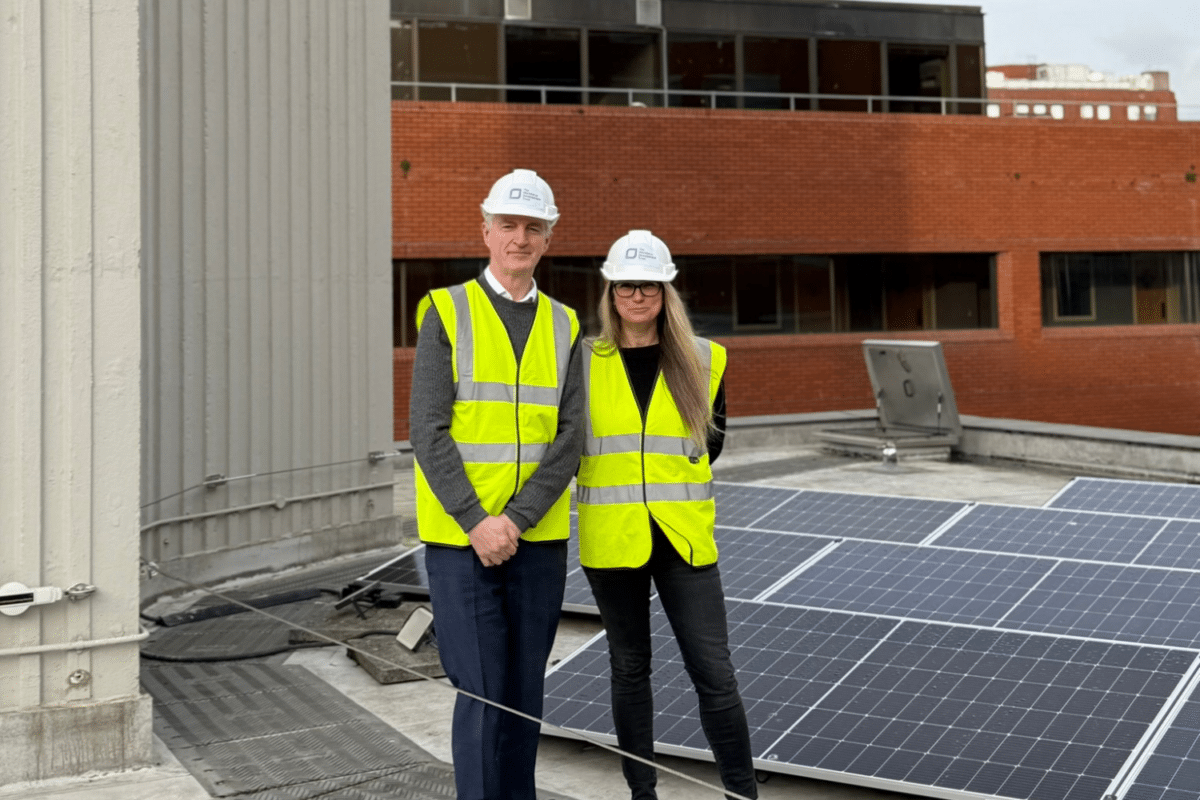Investment in renewable energy puts The Workforce Development Trust on course for net zero

The Cheese Lane Shot Tower, home to charity The Workforce Development Trust, has been a distinctive feature of Bristol’s skyline for decades.
Like so many others, the building’s history is closely intertwined with that of the city’s industrial heritage, having opened during the late 1960s as a replacement for the original 18th century lead shot tower. The first lead shot tower, located in Redcliffe, was built by Bristolian William Watts, the inventor of the lead shot tower manufacturing process, who patented the technology in 1782. Lead shot continued to be manufactured in Bristol well into 1990s, before it was banned due to environmental concerns.
The ‘tower method’ of lead shot production is known to release toxic chemicals into local waterways. So much so that in a 1983 newspaper article the Bristol Evening Post, as it was then known, accused Sheldon Bush of poisoning birdlife and damaging wetlands across the city. Following Sheldon Bush’s eventual closure, the 142ft tower laid empty until it was converted into offices around the turn of the millennium.
With the support of a Green Business Grant from the Mayoral Combined Authority, the building has been fully upgraded and retrofitted with a range of carbon reduction measures, including low energy LED lighting and solar panels. Green Business Grants are designed to support SMEs in the West of England region to purchase and install new products and equipment to reduce their greenhouse gas emissions, cut utility costs and improve energy efficiency.
A total of £2 million has been made available for businesses across the region but those who are interested will need to apply by March next year when the scheme comes to a close.
The Workforce Development Trust, a charity group that supports the NHS and other frontline public services to develop and maintain a sustainable workforce, estimates that up to 18% of its energy usage will now be generated from solar. In Co2 terms, this equates to roughly the equivalent of 2 tonnes of greenhouse gases per year.
“It’s a start,” admits John Rogers, Chief Executive of The Workforce Development Trust, himself an early adopter of electric cars and solar panels at his home.
“But we know that there is much further to go to reach our net zero target of 2035,” he continues.
“We produced our first ever carbon reduction plan a couple of years back and this has been central to bringing forward and accelerating the changes required, as it helps us to keep track of our progress through providing a clear objective and roadmap for the whole organisation to work towards.”
The charity CEO credits the Mayoral Combined Authority with helping to kickstart The Workforce Development Trust’s journey to net zero, having produced a comprehensive free carbon reduction report which enabled the organisation to formulate its plans.
Due the building’s grade II-listed heritage status, the 16-grant funded solar panels were installed on the flat roof immediately below the 43 m tall concrete structure. In sharing the somewhat checkered history of a building that many in the city will be familiar with, Rogers is hoping that fellow business leaders come to realise that even the unlikeliest of spaces can yet be made more energy efficient as organisations begin to decarbonise.
“By sharing our slightly quirky journey, we’re hoping that it will help to inspire other small charities and businesses in the region to seek out the support they need to reduce their carbon emissions.
“Given the current economic situation, SMEs can be forgiven for thinking that solar panels, LED lighting and a range of other carbon reduction measures are far too expensive and out of their reach.
“However, for businesses located in the West of England, the support to make these investments is definitely out there,” says Rogers.
“The Mayoral Combined Authority have been fantastic from start to finish in supporting us to reach our carbon reduction goals and are a vital ally for charities and businesses across the region.”